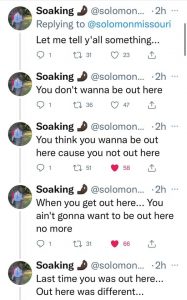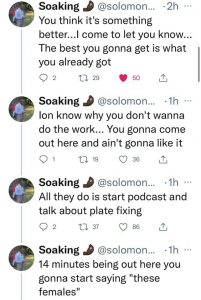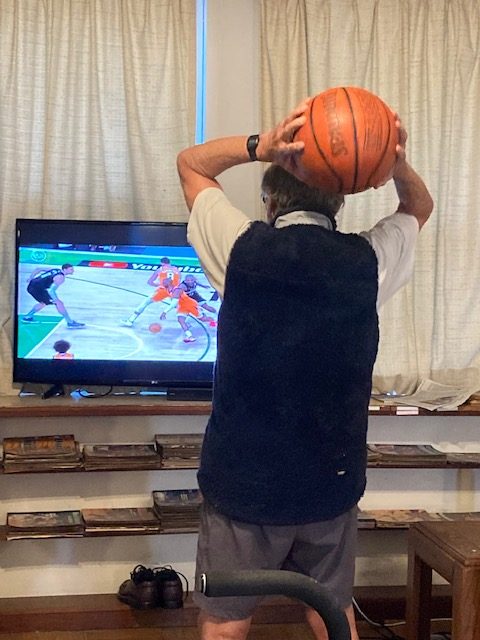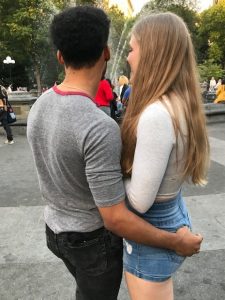Dell Curry is divorcing his wife of 30+ years and this man aims to help (“Do you like Tumeric??? Charcoal Ice Cream??? You better learn to like it.”)


A Website of the Radical Imagination
Dell Curry is divorcing his wife of 30+ years and this man aims to help (“Do you like Tumeric??? Charcoal Ice Cream??? You better learn to like it.”)


The circumstances of his life were marked by that strange but rather common phenomenon – perhaps, in fact, it’s true for all lives – of being tailored to the image and likeness of his instincts, which tended towards inertia and withdrawal.
Doing Yoga, I Think About Simone Biles And My Nonbinary Child

1. Fallen Stars
Just as far right politicians, in France and the United States, indulge in theories that warn of the danger of being “replaced” by a population intent on taking not only their rightful place, but destroying them (annihilating their very being), the basketball world is experiencing an analogous phenomenon. And why not? Those “Basketball Is Life” t-shirts had it at least partially right: let’s settle for “Basketball Mirrors Life.” One can always find a parallel phenomenon.
The other day I sat with a man, his name is Ricardo. Or was. I hope is. He was less than a mile from my home, which is filled with the things I buy with paintings—whole bean coffee, volcanic face masks, limonada, audiophile-approved speakers. I can’t stop thinking how close he was, I keep looking out my kitchen window in the direction of Ricardo.
Rummaging through Rat Bohemia, People in Trouble, and Forgetting Dolores, I am wondering how to confront or forget Sarah Schulman’s magisterial, if also monumental, heavy-weight, literally door-stopping Let the Record Show: A Political History of ACT UP New York, 1987-1993. Whew! Who can forget those years of what I once termed (in earlier writing on this crisis and epoch) euphoric fear. Schulman’s novels prophesied it.
So, I am in the tight waiting room sharing space and chairs with half dozen black men in their fifties and sixties — the oldest of them twenty years younger than me. They are all of them thin and dressed in poverty uniform: shabby sweat pants or jeans slipping off slack thighs, loose sweaters and shirts that had once been molded to thicker chests and arms. Tired eyes, mustaches and hair combed, but still unkempt. Worn men, their unprivileged lives on display. They had all of them been driven up by van from black Brooklyn to glossy Mid-town Manhattan for their daily radiation doses.
When I read remarks from people prefaced with a series of identity markers (like bar code)—as a gay, het, trans, white, black, disabled, poor, rich, and so on—as if this is who you are, I think, this is not who you are. I think, this tells me nothing I can smell, taste, see, touch, hear. I think, who you are is the bird song you heard through the window that morning, or wished you could recapture from that visit to Tuscany. I think, you are your face in sleep. You are the way you lick the bowl and the way you hold out your hand for a dog to sniff.
Helen Frankenthaler once mused that “artists were like cockroaches, for them everything was grist for the mill…” Philip Roth’s grist came from his close observation of people in his orbit and the world at large. But mostly it came from his own life which he constantly chewed up and regurgitated as fiction until the line between the two blurred.
This is the first chapter in the author’s memoir: Out of Brownsville: Encounters with Nobel Laureates and Other Jewish Writers (2012). (Paperback edition available from University of Massachusetts Press.)

As a resident of Greenwich Village, my local park is Washington Square. I can’t account for what goes on there late at night. According to the media, there’s a riot going on after dark, with bottles being thrown at cops, brawls and even stabbings. There are those in the neighborhood who want to see a curfew in the park, as well as a skateboard ban and restrictions on how many people can be there. These Good Citizens are aiming at the one source of disturbance they can control: the young. But the atmosphere of frantic abandon is too widespread in the city to be controlled. Many people have emerged from lockdown with intense pent-up feelings, and challenges to the police make law enforcement a tricky task. Last week, a deranged man smashed the windows of my favorite diner and decked the 73-year-old cook. Hundreds of dirt bikes have roared up the avenue under my window at 1 a.m. Bursts of impromptu fireworks pierce the slats of my blinds, and I often hear cries of unleashed rage. In the wee hours, I don’t go out wearing flowers in my hair.
There’s a racial subtext to this issue, since the crowd in the Square includes many people of color, and they bring the culture of their neighborhoods, including music. Race and class have always been the flashpoint of disputes over urban turf, but in the streets of Greenwich Village the rules are lightly applied, even if the mixing doesn’t extend to the high-rent apartments. It’s no surprise that Washington Square is now a site of that diversity, since it has a storied history of free expression. The mood may be hard-edged after midnight, but at twilight, when the sunset is golden in the windows of innumerable buildings, it’s mellow yellow. I have seen no violence, but lots of casual toking and flirting—yes, there is plenty of cruising among people of all races, genders, sexualities, and hair colors that defy the human genome.
After meeting Gerald Hausman as a fellow poet and colleague in the Poet-in-the-Schools program in Massachusetts in the early 1970s, I soon admired his poetry. The work seemed to me a fresh incarnation of a tradition I identified with Gary Snyder, Philip Whalen and Lew Welch. Uniquely, looking into those early chapbooks today, the work continues to hold its charge. Over the years, while we stayed in touch and exchanged books, it was only recently, with the publication of two new books, Little Miracles and Mystic Times with Noel Coward in Jamaica, both of which might be characterized as nonfiction novels, that I recognized he’d in the meantime emerged in a way I never could have imagined. In his prose the same ease and accuracy remain, and a deceptive modesty in the tone, but the explorations have expanded and magnified in all directions. I haven’t read anything that has affected me so powerfully in years. A.S.
Gerald Hausman arranges stories of his life under four headings–“Starting Out,” “Writing,” “People & Places,” “Traveling.” What follows are chapters from each of those sequences in Little Miracles…
The author–a columnist at Inside Higher Ed–thought this piece belonged in First in the Month. Your editor was glad to take him up on his proposal to reprint it…
In the sort of coincidence that makes a columnist’s work much easier, the Library of America published Richard Wright’s The Man Who Lived Underground: A Novel on April 20 — the same day, as it turned out, that a jury in Minneapolis convicted a police officer of murdering George Floyd last year.